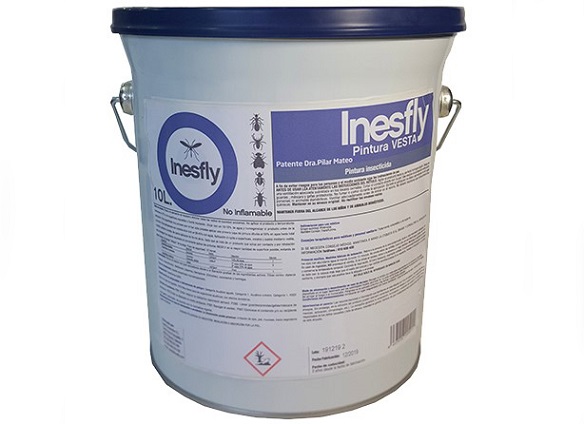Dengue News: Transfluthrin-Based Insecticide Paints Can Repel Mosquitoes And Curb Dengue, Malaria And Zika Outbreaks
Nikhil Prasad Fact checked by:Thailand Medical News Team Mar 11, 2024 1 year, 1 month, 2 weeks, 5 days, 8 hours, 59 minutes ago
Dengue News: Vector-borne diseases, responsible for over 17% of all infectious diseases globally, pose a significant threat, particularly in tropical and subtropical regions. Among these diseases, malaria and dengue, transmitted by mosquitoes, disproportionately affect the most vulnerable populations. In the island nation of Cabo Verde, off the west coast of Africa, vector-borne diseases have been a longstanding issue due to the geographical location, climate, and insufficient infrastructure. In response to this ongoing challenge, researchers in Cabo Verde and Spain have introduced a groundbreaking solution: insecticide-based paints designed to repel mosquitoes and curb the spread of diseases like dengue and Zika.
 Transfluthrin-Based Insecticide Paints Can Repel Mosquitoes And Curb Dengue, Malaria And Zika Outbreaks.
The Research and Testing Process
Transfluthrin-Based Insecticide Paints Can Repel Mosquitoes And Curb Dengue, Malaria And Zika Outbreaks.
The Research and Testing Process
A recent study conducted in Cabo Verde explored the efficacy of three insecticide paint formulations as part of a national program to minimize disease outbreaks. The lead author, Dr Lara Ferrero Gómez, coordinated a research group on tropical diseases at the Jean Piaget University of Cabo Verde. The study focused on the VESTA insecticide paint, specifically designed to target the Aedes aegypti mosquito, which is responsible for diseases such as yellow fever, dengue, and Zika.
The large-scale field trial involved trained volunteers painting 228 houses in vulnerable neighborhoods of Praia, the capital city of Cabo Verde. These areas were selected due to factors such as poor drainage, leading to flooding during the rainy season, and inadequate wastewater management. Additionally, many residences stored water in unsafe conditions due to unreliable water supply, creating ideal breeding grounds for disease-carrying mosquitoes.
Results and Effectiveness
The WHO cone bioassays conducted at various intervals after painting revealed promising results. All three insecticide paint formulations led to complete mortality of Aedes aegypti mosquitoes one month after application. Even after three months, all formulations exceeded the WHO efficiency threshold of 80%, demonstrating the sustained impact of the insecticidal paint. Notably, the VESTA formulation met WHO requirements at both the six-month and one-year marks.
Dr Ferrero Gómez told
Dengue News journalists, "Our project and study demonstrated that VESTA insecticide paint is effective at killing Aedes aegypti, the yellow fever mosquito, in the city of Praia for at least one year.”
Dr Ferrero Gómez emphasized the sustainable and eco-friendly nature of the paint, which releases small quantities of insecticide over an extended period. The researchers did not observe any serious health effects on residents, with only a few reporting mild irritations such as eye or nose irritation (10%) and headaches (4%).
Malaria-Free Cabo Verde: Addressing the Challenge of Reoccurrence
At the beginning of the year, Cabo Verde achieved the distinction o
f being the third country in Africa declared free of malaria by the World Health Organization (WHO). However, the challenge remains to prevent the reoccurrence of this debilitating disease. The researchers propose that insecticidal paint could serve as a promising strategy not only for controlling diseases like Zika and dengue but also for preventing and managing malaria cases at the household level.
Despite certain limitations, such as the meticulous application required in two layers to maintain effectiveness, the success of the TINTAEDES project is expected to expand to more locations across Praia and eventually throughout Cabo Verde.
Insecticide Paints: A New Community Strategy for Vector Control
The TINTAEDES project, implemented in 2022, marks a significant step forward in the fight against mosquito-borne diseases in Cabo Verde. The project, a collaboration between Universidade Jean Piaget de Cabo Verde, Inesfly Corporation S.L., Universidad de La Laguna (ULL)-Spain, Fundación Canaria para el Control de las Enfermedades Tropicales (FUNCCET)-Spain, Instituto Nacional de Saúde Pública-Cabo Verde, and SITA - Sociedade Industrial de Tintas, S.A-Cabo Verde, aimed to assess the efficacy, acceptability, and operational deployment of insecticide paint for Aedes control.
The project involved laboratory and small-scale field trials, utilizing World Health Organization cone bioassays to assess mosquito mortality. A community-based intervention study in vulnerable neighborhoods of Praia, Cabo Verde, implemented a self-application model of insecticide paint by homeowners and neighborhood volunteers.
The results indicated that the transfluthrin-based insecticide paint demonstrated efficacy against wild Aedes aegypti for up to one year in laboratory and semi-field conditions. Residents in the painted houses reported a significant reduction in mosquito presence, with 98% confirming the effectiveness of the intervention.
Conclusion and Future Directions
Insecticide paints, as demonstrated by the TINTAEDES project, emerge as an effective and innovative strategy for mosquito control in Cabo Verde. The study's success suggests that insecticide paint could reinforce existing vector control programs and serve as a preventive measure against arboviruses and other vector-borne diseases.
The positive community response, coupled with the sustained efficacy of the insecticide paint, highlights its potential as a viable solution for intra-domiciliary control of mosquito vectors. While further research and large-scale community interventions are recommended to reaffirm these findings, the TINTAEDES project offers a promising blueprint for future vector control strategies in Cabo Verde and beyond. As the world grapples with the ongoing threat of vector-borne diseases, innovative approaches like insecticide paints provide hope for more sustainable and community-driven solutions to protect vulnerable populations.
The study findings were published in the peer reviewed journal: Frontiers in Tropical Diseases.
https://www.frontiersin.org/articles/10.3389/fitd.2024.1321687/full
For the latest
Dengue News, keep on logging to Thailand Medical News.
